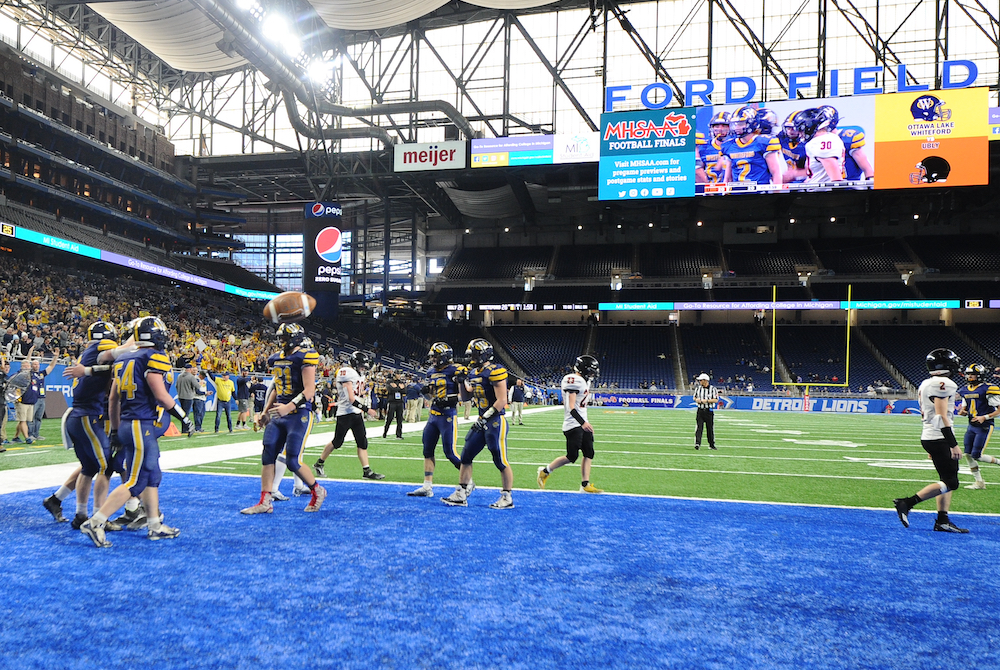
5 Questions for 8-Player Football
April 10, 2017
The 2017 8-Player Football Playoffs will be conducted over four weeks in two divisions of 16 teams each for the 60-plus teams sponsored by Michigan High School Athletic Association Class D schools.
That much was decided by the MHSAA Representative Council on March 24.
There are five questions (at least) that the Council still must answer:
-
How should teams qualify? Since the first 8-player tournament in 2011, teams have qualified by playoff point averages – the 16 highest qualified for the tournament. Should this be changed to a system of automatic qualifiers on the basis of wins, plus additional qualifiers on the basis of playoff points to complete the field – like the 11-player tournament operates?
-
When should divisions be determined? Should it be in late March when division breaks for other “equal divisions” tournaments are set? Or should divisions be determined nearer the start of the season – say, September 1 – so all late additions, deletions, and cooperative program changes can be factored in before the two divisions, based on enrollment, are determined?
-
Where will the championship games be played? Should the Council designate a doubleheader at the Superior Dome in Marquette so the MHSAA can focus all its resources on one climate-controlled facility? Or should two sites be designated now (perhaps the Superior Dome in Marquette and Legacy Field in Greenville), and the specific games and times assigned as the playoffs progress in an attempt to reduce travel times for teams and spectators?
-
Should the maximum enrollment for the 8-player tournament be the moving target of the Class D maximum (203 in 2017) or a fixed number – for example, 215, the Class D maximum in 2011 when the 8-player tournament began? This decision could be deferred to the Council’s meeting in December.
-
Should there be a “grace period” for schools that are eligible for the 8-player tournament one year but have enrollments that exceed the 8-player limit the next year – for example, eligible only the following year and only if the enrollment does not exceed the 8-player enrollment limit by more than 12 students? This decision could also be delayed to the December meeting of the Council.
As our excitement builds for the expanded 8-player tournament, so do the questions.

Set, Ready, Challenge: 11-Player Football Finals Challenges New in 2022
By
Jon Ross
MHSAA Director of Broadcast Properties
November 25, 2022
New this year at the MHSAA 11-Player Football Finals is the opportunity for head coaches to challenge a call.
In previous years, all potential scoring plays and potential turnovers were automatically reviewed. That process will continue and now, under a limited set of circumstances, the head coach can challenge calls.
To do so, the head coach must first call a timeout. If a team has no timeouts remaining, they are not able to challenge a call. Challenges must be presented to the officials immediately after the timeout is granted. If the challenge is successful, the team will get its timeout back and have the ability to challenge one more call during regulation. A second successful challenge will not result in the ability to challenge a third call.
The following plays are reviewable by challenge:
- Complete/incomplete passes
- Runner/receiver in/out of bounds
- Runner ruled not down
- Forward progress spot as it relates to the yard to gain
- First touching of a kick
- Recovery of a ball in/out of bounds
- Forward/backward pass
- Penalties called on the field only for:
- Illegal forward pass
- Targeting or illegal helmet contact
- Pass interference only as it relates to the pass being previously tipped
NOTE: All other penalties called on the field are not reviewable. These include, but are not limited to: illegal formation, ineligible receivers downfield, illegal participation, illegal substitution or delay of game. If a penalty is not called by the officials on the field, the play can never be reviewed to retroactively call a penalty.
In overtime, challenges – like timeouts – reset. Each team has the ability to challenge one call for the entirety of overtime, but must have a timeout to use to do so. A successful challenge in overtime will not result in the ability to challenge a second call.
If a play is overturned in regulation or overtime, the replay officials will correct all aspects of the play including time, position of the ball and whether the clock will be started on the RFP or snap. The game clock or play clock may be reviewed only as it directly relates to the overturning of a call on the field.
There is no change to the review of potential scoring and potential turnover plays. Those plays are automatically looked at by the replay official and replay assistant. If the replay official can confirm the ruling on the field without stopping play, the official will do so. If more time is needed to review the play, the on-field referee will announce that and then will announce the replay official’s decision. For a play to be reversed, there must be indisputable video evidence that shows the original call was incorrect. Every attempt will be made to complete the review process in 90 seconds or less.
The addition of the coach’s challenge was approved by the MHSAA’s Representative Council at its May 2022 meeting.

